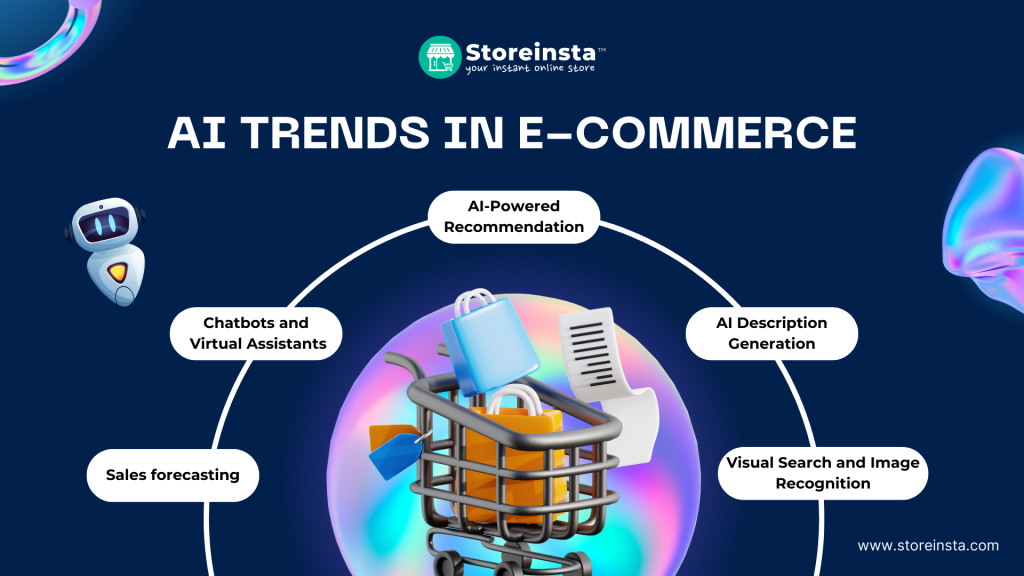The AI trend in the e-commerce landscape is rapidly evolving, with newer innovative technologies and upgrades being brought to life on a daily basis. In today’s era, one of the most significant driving forces behind the digital transformation is artificial intelligence (AI). AI is revolutionising the way businesses operate, especially in the realm of e-commerce, where it is reshaping the customer experience, optimising operations, and driving growth. Let’s delve into the AI trends shaping the future of e-commerce.
AI-Powered Recommendation:
Engines analyse vast amounts of data, including past purchase history and browsing behaviour, and demographics, to deliver personalised product recommendations to shoppers. By understanding individual preferences and intent, e-commerce platforms can offer tailored shopping experiences that increase engagement, drive conversions, and foster customer loyalty.
Sales forecasting:
Sales forecasting is a predictive analysis technique used by businesses to estimate future sales based on historical data, market trends, and other relevant factors. By analysing past performance and current market conditions, businesses can anticipate future demand, optimise inventory levels, and make informed decisions to drive growth and profitability. Accurate sales forecasting helps businesses allocate resources effectively and adapt strategies to meet customer demand efficiently.
35% of e-commerce companies are using AI and 42% of companies are exploring AI for its implementation in the future
Visual Search and Image Recognition:
Visual search technology powered by AI allows shoppers to search for products using images rather than text. By leveraging image recognition algorithms, e-commerce platforms can accurately identify products in photos uploaded by users, enabling seamless discovery and facilitating faster purchase decisions.
To know more about the trending products to sell online, visit: https://storeinsta.com/blogposts/2022/07/21/trending-products-to-sell-online/
Chatbots and Virtual Assistants:
The next big AI trend in E-commerce are AI-powered chatbots and virtual assistants, revolutionising customer service in e-commerce. These intelligent bots leverage natural language processing (NLP) algorithms to understand and respond to customer queries in real-time, providing personalised assistance, answering product-related questions, and even processing orders. By automating routine tasks and providing 24/7 support, chatbots enhance customer satisfaction and streamline the shopping experience.
Explore our One-Time payment option and get rid of monthly subscriptions, To learn more, click on: https://www.instagram.com/p/C3xt90noQqI/?igsh=MWlhb2NiOXlpOHUxNw==
AI Description Generation:
It utilises artificial intelligence algorithms to automatically create compelling product descriptions. By analysing product attributes, customer preferences, and linguistic patterns, AI generates unique and engaging descriptions that effectively communicate product features and benefits. This streamlines content creation processes, saves time, and enhances the overall quality of product listings, leading to increased sales.
AI trend in e-commerce is expected to drive a 37% reduction in costs for businesses in 2024.
Fraud Detection and Prevention:
AI-powered fraud detection systems leverage machine learning algorithms to analyse transaction data and detect fraudulent activities in real-time. By continuously learning from new patterns and anomalies, these systems can identify suspicious transactions, prevent unauthorised access, and protect e-commerce businesses from financial losses and reputational damage.
In conclusion, AI is reshaping the e-commerce industry, driving innovation, and unlocking new opportunities for businesses to thrive in a competitive marketplace. As AI continues to evolve, its impact on e-commerce will only grow stronger, shaping the future of online retail in profound and transformative ways.
StoreInsta uses advanced artificial intelligence (AI) to provide businesses with a range of capabilities, including bulk upload, recommendation engines,Address Optimizer, AI description generators, and sales forecasting. These features help people run their e-commerce businesses more effectively and boost growth in the competitive online marketplace by improving efficiency, increasing productivity, and optimising decision-making processes.

